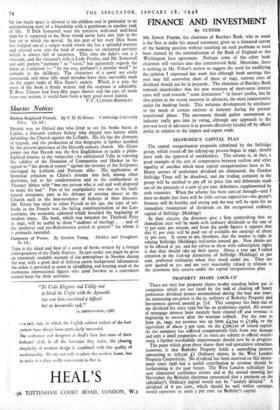Shorter Notices
Bishop Reginald Pecock. By V. H. H. Green. (Cambridge University Press. 12s. 6d.)
PECOCK was an Oxford don who lived to see his books burnt at Carfax, a fifteenth century bishop who slipped into heresy while defending the Church against the Lollards. His life has the elements of tragedy, and the production of this biography is further justified by the present ignorance of the fifteenth century church. Mr. Green points out that Pecock was the first Englishman to tackle a philo- laphical treatise in the vernacular ' • he anticipated Valla in rejecting the validity of the Donation of Constantine and Hooker in his appeal to "the doom of reason" against the tyranny of the Scriptures envisaged by Lollards and Puritans alike. His application of historical criticism to Christ's descent into hell, among other doctrines, led to his condemnation and to his confinement in Thomey Abbey with "but one person who is sad and well disposed to make his bed." Part of his unpopularity was due to his intel- lectual arrogance, part to his defence of existing abuses in the Church such as the non-residence of -bishops in their dioceses. Mr. Green has tried to relate Pecock to his age, the time of set- backs in the French war, the failing constitutionalism of the Lan- castrians, the economic upheaval which heralded the beginning of modern times. His book, which was awarded the Thirlwall Prize in 1941, will be useful to those "students of theology . . . and of the medieval and pre-Reformation period in general" for whom it is primarily intended.
Outposts of Peace. By Gordon Young. (Hodder and Stoughton. 8s. 6d.) Tuts is the third and best of a series of books written by a foreign correspondent of the Daily Express. In just under 200 pages he gives an extremely readable account of the atmosphere in Sweden during the war, with a good deal of hitherto secret background information. An index is provided to assist in identifying and 'keeping track of the numerous international figures who used Sweden as a convenient neutral basis for their activities.


























 Previous page
Previous page